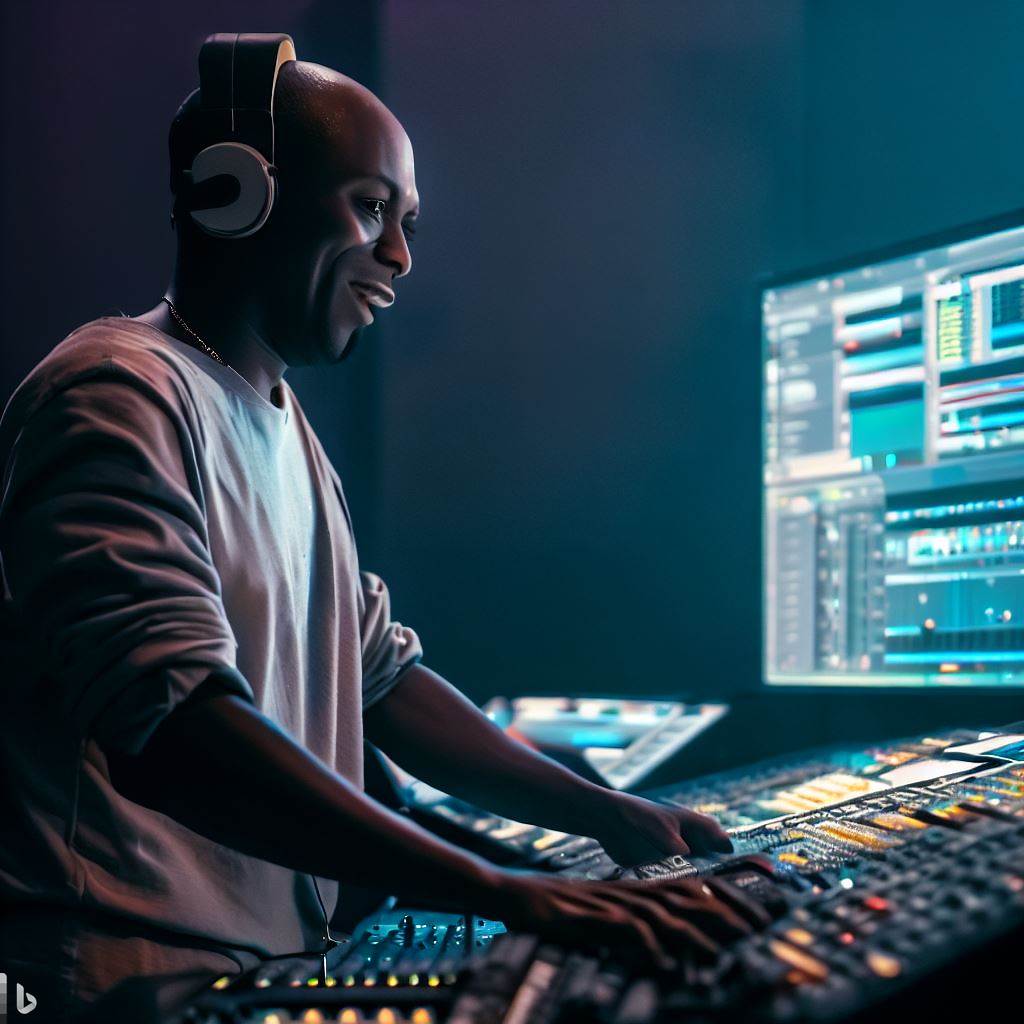Introduction
Sound Effects Editor Tools enrich Nigeria’s entertainment, enhancing audio in films, TV, music, and more.
To achieve professional sound effects editing, Nigerian editors require specific tools that are essential for their craft.
These tools aid in creating and manipulating various sound effects, including ambient sounds, explosions, footsteps, and voices.
One important tool for Nigerian sound effects editors is a high-quality digital audio workstation (DAW) software.
This software allows editors to import, edit, and mix different audio elements for a seamless final product.
Additionally, a comprehensive sound effects library is crucial.
This library should include a wide range of audio samples such as nature sounds, urban noises, and unique Nigerian cultural elements.
These samples serve as the building blocks for creating sound effects that accurately represent the Nigerian setting.
Furthermore, hardware equipment like professional-grade microphones and headphones ensure the capture and monitoring of high-quality audio during recording and editing processes.
Tailored plugins and software aid Nigerian editors in perfecting audio for industry-standard sound effects.
In fact, sound effects editing plays a significant role in the Nigerian entertainment industry.
Equipping Nigerian sound effects editors with the necessary tools and software ensures the creation of immersive and captivating audio experiences for audiences in Nigeria and beyond.
Section 1: Essential software tools
As a sound effects editor in Nigeria, it is crucial to have the right software tools to enhance your creativity and productivity.
Popular software tools used by Nigerian sound effects editors
Below, we discuss some popular software tools used by Nigerian sound effects editors, their features, capabilities, and how they are utilized in the industry.
1. Pro Tools
- Pro Tools is a widely used digital audio workstation that offers a comprehensive set of tools for sound effects editing.
- It provides advanced editing features like non-destructive editing, real-time automation, and extensive plugin support.
- Sound effects editors in Nigeria utilize Pro Tools for various tasks, such as cleaning up audio recordings, synchronizing sound effects with visuals, and creating complex soundscapes.
2. Adobe Audition
- Adobe Audition is another popular software tool for sound effects editing.
- It offers a user-friendly interface and powerful audio editing capabilities, including noise reduction, spectral editing, and multi-track mixing.
- It can be used for tasks like removing background noise from recordings, manipulating sound frequencies, and mixing different sound elements together seamlessly.
3. Sound Forge
- Sound Forge is a versatile audio editing software known for its precision and efficiency.
- It provides a wide range of editing tools, such as time stretching, pitch shifting, and audio restoration.
- Sound Forge is often used for enhancing and manipulating individual sound files, creating sound loops, and applying special effects to specific sounds.
4. RX Audio Editor
- RX Audio Editor by iZotope is a powerful software tool specifically designed for audio restoration and repair.
- It includes advanced features like spectral editing, noise reduction, and audio enhancement.
- Utilizing it for tasks such as removing clicks, pops, and background noise from audio recordings, restoring damaged audio files, and improving overall sound quality.
5. Native Instruments Kontakt
- Native Instruments Kontakt is a popular software sampler that allows sound effects editors to access a vast library of high-quality virtual instruments and sound effects.
- In Nigeria, sound effects editors rely on it to add realistic and diverse sound elements to their projects, such as virtual drums, orchestral instruments, and cinematic soundscapes.
Having the right software tools is indispensable for Nigerian sound effects editors.
Various tools like Pro Tools, Adobe Audition, Sound Forge, RX Audio Editor, and Kontakt empower editors to craft captivating auditory experiences.
Each offers unique capabilities for comprehensive, user-friendly, precise editing and diverse sound manipulation.
Read: How to Become a Sound Effects Editor in Nigeria
Section 2: Sound libraries
Importance of using high-quality sound libraries for effective sound effects editing
To excel in sound effects editing, high-quality sound libraries are crucial. They provide diverse and authentic source material.
Using these libraries, editors can enhance realism and creativity. Sound libraries expand the sonic palette, enabling editors to match visuals precisely.
They streamline the editing process, saving time and effort. By incorporating premium sound libraries, editors elevate their projects, making a lasting impact on audiences.
Popular sound libraries are available to Nigerian editors
One crucial aspect of being a sound effects editor in Nigeria is having access to high-quality sound libraries.
Using these libraries can greatly enhance the effectiveness of your sound effect editing.
Here are some popular sound libraries available to Nigerian sound effects editors:
- Pro Sound Effects Library: This extensive library offers a wide range of professionally recorded sounds.
- Sound Ideas: Known for its diverse collection, Sound Ideas provides sound effects for various industries.
- Boom Library: Specializing in high-quality cinematic sounds, Boom Library is a great choice for film editors.
- Freesound: A commonly used resource for free sound effects, Freesound offers a vast database of user-contributed sounds.
- Soundly: This online sound library provides a large collection of high-quality sounds for easy access and management.
Tips for effectively organizing and managing sound libraries
When it comes to organizing and managing sound libraries effectively, here are some tips:
- Create a folder structure that reflects the different categories and types of sounds you have.
- Label your sound files with descriptive and easily searchable names.
- Consider using metadata to tag your sound files with relevant information, such as keywords and descriptions.
- Take advantage of sound library management software, such as Soundminer or BaseHead, to streamline your workflow.
- Regularly update and maintain your sound libraries by adding new sounds and removing outdated or irrelevant ones.
In short, having access to and effectively using high-quality sound libraries is vital for Nigerian sound effects editors.
These libraries provide a wide range of sounds that can enhance the editing process and make their work more impactful.
Read: Market Demand for Sound Effects Editors in Nigeria
Section 3: Recording equipment
When it comes to sound effects editing, having the right recording equipment is crucial. Nigerian sound effects editors need a range of tools to capture high-quality audio.
Essential recording equipment needed by Nigerian sound effects editors
In this section, we will provide an overview of the essential recording equipment needed for sound effects editing in Nigeria.
Microphones
Microphones are the primary tools for capturing sound. Nigerian sound effects editors should have a variety of microphones to suit different recording situations.
Here are some types of microphones commonly used:
- Dynamic microphones: These are durable and can handle high sound pressure levels, making them suitable for recording loud sounds like explosions or gunshots.
- Condenser microphones: These are more sensitive and capture a wider frequency range, making them ideal for capturing subtle sounds and natural ambiance.
- Ribbon microphones: These vintage microphones provide a warm, smooth sound and are often used to capture instruments or vocal performances.
It is recommended for Nigerian sound effects editors to have at least one of each type of microphone in their toolkit to ensure versatility in capturing various sounds.
Recorders
After capturing audio with microphones, sound effects editors need reliable recorders to store and manipulate the recorded files.
Here are some types of recorders commonly used:
- Portable recorders: Compact and battery-powered, these recorders are perfect for field recording and capturing sounds on the go.
- Multitrack recorders: These recorders offer more advanced recording capabilities and allow for simultaneous recording of multiple audio sources.
- Computer audio interfaces: These interfaces connect microphones directly to a computer for recording and editing purposes. They offer flexibility and ease of use.
Having a combination of portable recorders and computer audio interfaces is recommended for Nigerian sound effects editors, as it provides both mobility and professional recording options.
Other necessary tools
Aside from microphones and recorders, Nigerian sound effects editors also need a few other tools to enhance their recording and editing workflow. Here are some essential tools:
- Boom poles: These extendable poles hold microphones, allowing sound effects editors to capture audio from a distance.
- Shock mounts and windshields: These accessories reduce handling noise and wind interference, ensuring clean recordings.
- Headphones: High-quality headphones are crucial for monitoring recordings and ensuring accurate sound representation.
- Pop filters: These tools reduce plosive sounds (such as “p” or “b” sounds) during vocal recordings, resulting in cleaner audio.
Considerations for budget-friendly options
- Research and compare prices from different retailers to find the best deals.
- Consider buying used equipment from reputable sources to save money without compromising quality.
- Look for bundle packages that offer multiple tools at a discounted price.
- Read reviews and seek recommendations from fellow sound effects editors to ensure you are investing in reliable equipment.
Recommended quality equipment
- Shure SM57 dynamic microphone: A versatile and durable microphone suitable for capturing a wide range of sounds.
- Rode NT1 condenser microphone: Known for its low self-noise and transparent sound, it is a popular choice for recording subtle details.
- Zoom H5 portable recorder: This compact recorder offers excellent audio quality, interchangeable microphones, and multiple track recording.
- Focusrite Scarlett audio interface: A reliable and affordable choice for connecting microphones to a computer for editing purposes.
Sound effects editing in Nigeria requires the right recording equipment for professional and high-quality results.
By investing in the right tools and considering budget-friendly options, Nigerian sound effects editors can successfully enhance their audio productions.
Read: Success Stories: Top Nigerian Sound Effects Editors

Section 4: Foley artistry tools
Definition and significance of Foley artistry in sound effects editing
In sound effects editing, Foley’s artistry plays a significant role in adding realism and depth to the audio.
Foley is the process of creating sound effects by recording and manipulating everyday objects to match the actions onscreen.
Essential tools used by Nigerian foley artists
Here are some essential tools used by Nigerian foley artists:
- Props: Foley artists utilize various props such as clothes, shoes, and kitchen utensils to recreate different sounds.
- Microphones: High-quality microphones are crucial for capturing the intricate details and nuances of foley work.
- Surfaces: Different surfaces like concrete, wood, or gravel are essential for producing realistic footsteps and other environmental sounds.
- Footwear: Foley artists use different types of shoes and boots to replicate specific footstep sounds.
- Clothing: Different fabrics, like leather, cotton, or nylon, are used to create various rustling or movement sounds.
- Tools: Foley artists utilize tools like hammers, screwdrivers, or knives to replicate specific actions or mechanical sounds.
- Body parts: Foley artists also use their own bodies to create sounds, such as hand claps, finger snaps, or breathing.
- Props storage: Foley artists need proper storage systems for organizing and accessing their extensive collection of props.
- Recording equipment: A high-quality audio recorder and editing software are necessary for capturing and refining the foley recordings.
- Studio setup: Foley artists require a dedicated physical space with appropriate acoustics and equipment to perform their work effectively.
Tips for creating realistic sound effects through foley work
Creating realistic sound effects through foley work requires attention to detail and precision. Here are some tips for achieving lifelike sound effects:
- Watch and analyze: Study the visual aspects of the scene carefully and understand the sounds required.
- Experiment: Try various objects and techniques to find the perfect sound for each action.
- Sync with visuals: Pay close attention to the timing and synchronization of the foley sounds with the visuals.
- Record multiple takes: Capture multiple versions of each sound to have options during the editing process.
- Layering: Combine multiple sound elements to create a richer and more complex final effect.
- Editing: Use audio editing software to refine and enhance the recorded foley sounds.
- Collaborate: Work closely with the sound designer and editor to ensure the foley sounds fit seamlessly into the overall audio design.
- Attention to detail: Pay attention to the subtler sounds like cloth movements, breathing, or soft touches, as they can significantly enhance the realism.
- Practice: Improve your foley skills through regular practice and experimentation.
- Continual learning: Stay updated with the latest techniques and tools in foley artistry to expand your capabilities.
With the right tools and techniques, Nigerian sound effects editors can create immersive and authentic audio experiences that enhance the impact of visual media.
You Might Also Like: Role of DJs in the Nigerian Wedding and Events Scene
Section 5: Collaboration tools
Collaboration is essential for Nigerian sound effects editors working in teams.
Effective communication and streamlined project management are critical for successful collaboration in this field.
Collaborative tools are necessary for Nigerian sound effects editors working in teams
In this section, we will discuss various collaborative tools that can enhance the editing process and facilitate efficient teamwork.
Project Management Software
Project management software plays a crucial role in coordinating and organizing tasks.
Tools like Trello, Asana, and Monday.com offer features such as task assignment, progress tracking, and deadline management.
Nigerian sound effects editors can utilize these tools to ensure everyone is on the same page regarding project objectives and timelines.
For example, a sound effects editor can create a Trello board with lists representing different stages of the editing process, such as recording, editing, and finalization.
Each team member can then be assigned specific tasks within these lists, making it easier to track progress and ensure timely completion.
File-sharing Platforms
Collaborative editing often involves working with large audio files. Without efficient file-sharing platforms, sharing and accessing these files can become a time-consuming task.
Platforms like Google Drive, Dropbox, and WeTransfer simplify the process.
Using Google Drive, for instance, a sound effects editor can create a shared folder where team members can upload and download files seamlessly.
This ensures that everyone has access to the necessary audio files and reduces the risk of version discrepancies.
Communication Tools
Smooth communication is vital for effective collaboration among sound effects editors.
Fortunately, there are numerous tools available for seamless communication, such as Slack, Microsoft Teams, and Zoom.
These tools allow real-time communication, file sharing, and video conferencing.
For instance, a Nigerian sound effects editor can create dedicated channels on Slack for different projects or specific discussions related to editing techniques or challenges.
Team members can then conveniently communicate and exchange ideas within these channels.
Streamlining the Editing Process
By using collaboration tools, Nigerian sound effects editors can streamline their editing process and improve productivity.
These tools eliminate the need for lengthy email threads, reduce downtime caused by file accessibility issues, and enable instant feedback.
For example, with project management software, editors can assign specific tasks to team members, ensuring a smooth workflow and efficient utilization of resources.
File-sharing platforms eliminate the need for physical transfers and allow immediate access to files from any location.
Communication tools provide instant feedback and enable quick resolution of queries or issues.
Facilitating Effective Collaboration
The use of collaboration tools in the editing process fosters effective teamwork, especially in the case of Nigerian sound effects editors who often work remotely or in different locations.
These tools bridge geographical barriers and enhance collaboration possibilities.
A Lagos-based sound editor can effortlessly partner with an Abuja colleague using project tools, file sharing, and communication software.
This enables efficient teamwork, even without physical proximity.
In essence, collaboration tools play a vital role in enhancing the editing process for Nigerian sound effects editors.
Project management software, file-sharing platforms, and communication tools streamline workflow, facilitate efficient resource utilization, and empower effective collaboration.
By utilizing these tools, sound effects editors can achieve better results and deliver high-quality work within timelines.
Read: How Nigeria’s Foley Artists are Redefining Sound in Cinema
Delve into the Subject: In-Depth Analysis: The Nigerian Music Producer’s Workspace
Section 6: Mobile apps for on-the-go editing
Mobile apps have revolutionized the way we work, allowing us to edit audio files anytime and anywhere.
For Nigerian sound effects editors, these apps are essential tools for their on-the-go editing needs.
Mobile apps that can assist Nigerian sound effects editors
Let’s explore some of the best mobile apps available and how they can assist Nigerian sound effects editors.
1. Audacity (Android, iOS)
- Audacity is a popular audio editing software that has a mobile app version.
- Its features include recording, editing, and applying effects to audio files.
- Nigerian sound effects editors can use Audacity to edit and enhance their sound effects remotely.
2. GarageBand (iOS)
- GarageBand is a powerful music production app, but it can also be used for sound effects editing.
- With its intuitive interface, Nigerian sound effects editors can easily cut, copy, and manipulate audio files.
- GarageBand also offers a wide range of effects and virtual instruments for creative sound editing.
3. WavePad (Android, iOS)
- WavePad is a professional audio editor that allows Nigerian sound effects editors to edit audio files on the go.
- Its features include cutting, copying, and pasting parts of an audio file, as well as adding effects.
- WavePad also supports a wide range of audio formats, making it versatile for Nigerian sound effects editors.
4. Soundtrap (Android, iOS)
- Soundtrap is a collaborative music studio that can also be used for sound effects editing.
- Nigerian sound effects editors can use Soundtrap to record and edit audio files remotely.
- The app offers real-time collaboration, allowing multiple users to work on the same project simultaneously.
5. Hokusai Audio Editor (iOS)
- Hokusai Audio Editor is a powerful audio editing app specifically designed for iOS devices.
- Nigerian sound effects editors can use Hokusai to edit, trim, and apply effects to their sound effects.
- The app also supports multi-track editing, allowing users to layer multiple sounds for more complex effects.
In summary, these mobile apps offer convenience and efficiency for Nigerian sound effects editors who need to edit audio files on the go.
Whether it’s cutting, copying, or applying effects, these apps provide the necessary tools for remote editing.
Audacity, GarageBand, WavePad, Soundtrap, and Hokusai Audio Editor are just some of the apps available that offer features and benefits tailored to the needs of Nigerian sound effects editors.
With these apps, Nigerian sound effects editors can bring their creativity and expertise with them wherever they go.
Conclusion
In review, having the right tools is crucial for Nigerian sound effects editors. These tools not only help them improve their editing skills but also enhance the overall quality of their work.
Throughout this blog post, we have discussed several essential tools that every Nigerian sound effects editor should have.
These include a reliable computer with sufficient processing power, a powerful digital audio workstation (DAW), a range of high-quality plugins, and a comprehensive library of sound effects.
Publish Your Professional Profile, Business or Brand
Showcase your expertise, gain trust, and boost visibility instantly on Professions.ng.
Publish NowIt is important for sound effects editors in Nigeria to understand the significance of these tools and invest in acquiring them.
With the right tools at their disposal, they can produce professional and captivating audio projects.
We encourage our readers to explore and leverage these tools to enhance their editing skills.
By investing in the right equipment and utilizing these tools effectively, Nigerian sound effects editors can take their work to new heights and deliver exceptional results.




